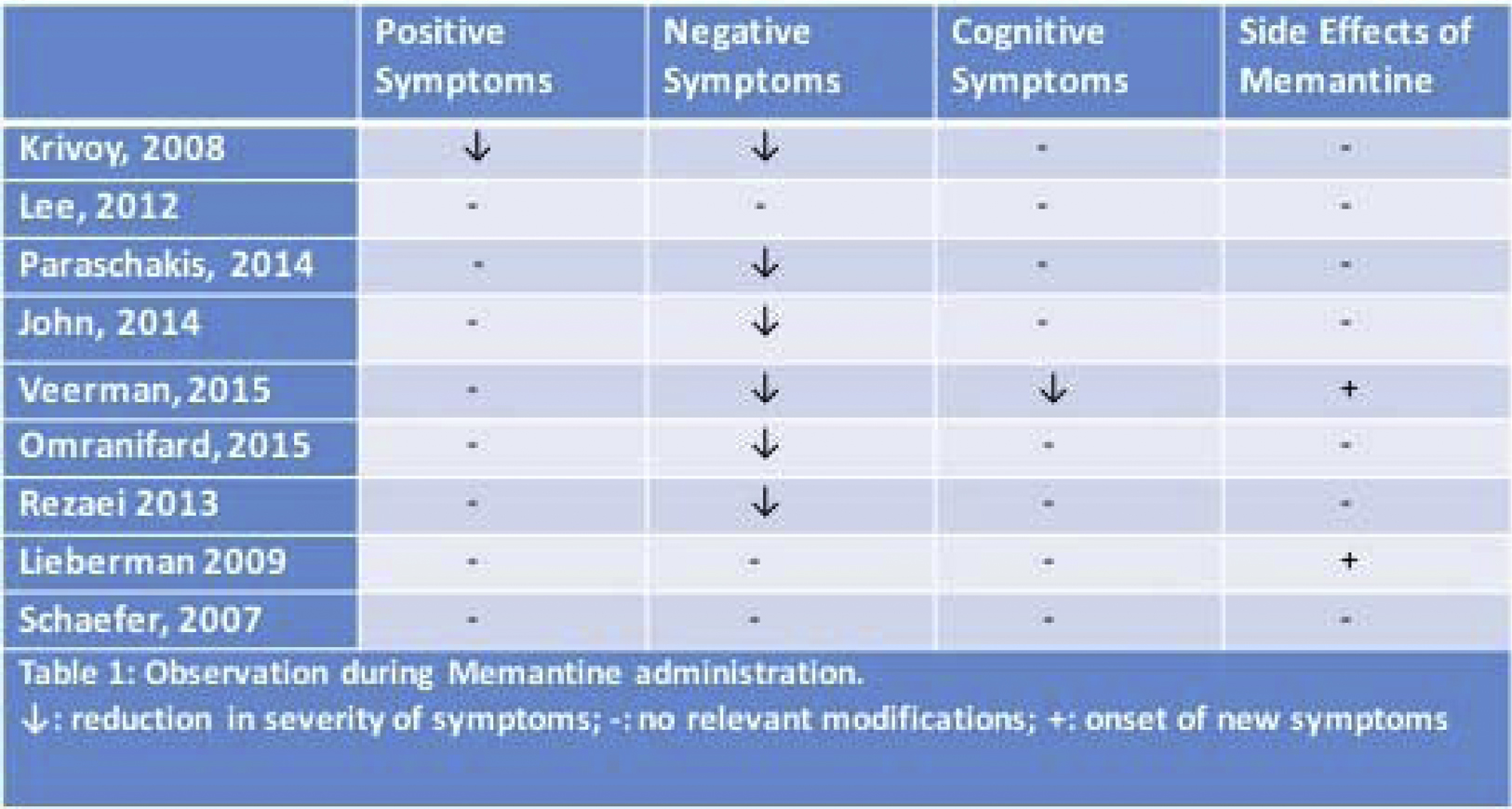Volume 41 - April 2017
EV1261
e-Poster Viewing: Schizophrenia and other psychotic disorders
Serum 25-OH vitamin D level in patients with schizophrenia spectrum disorders
-
- Published online by Cambridge University Press:
- 23 March 2020, p. s817
-
- Article
-
- You have access
- Export citation
EV1262
e-Poster Viewing: Schizophrenia and other psychotic disorders
Morphophenotypical patterns in patients with negative symptoms in schizophrenia
-
- Published online by Cambridge University Press:
- 23 March 2020, p. s818
-
- Article
-
- You have access
- Export citation
EV1263
e-Poster Viewing: Schizophrenia and other psychotic disorders
Comparison of cortisol levels in patients with schizophrenia and in healthy controls
-
- Published online by Cambridge University Press:
- 23 March 2020, p. s818
-
- Article
-
- You have access
- Export citation
EV1264
e-Poster Viewing: Schizophrenia and other psychotic disorders
Association between GRM3 gene polymorphisms and response to treatment in Moroccan schizophrenic patients
-
- Published online by Cambridge University Press:
- 23 March 2020, p. s818
-
- Article
-
- You have access
- Export citation
EV1265
e-Poster Viewing: Schizophrenia and other psychotic disorders
Remission and recovery from first-episode psychosis in adults: A systematic review and meta-analysis of long-term outcome studies
-
- Published online by Cambridge University Press:
- 23 March 2020, p. s819
-
- Article
-
- You have access
- Export citation
EV1266
e-Poster Viewing: Schizophrenia and other psychotic disorders
Neural modulations in processing of natural information in patients with schizophrenia and their unaffected siblings
-
- Published online by Cambridge University Press:
- 23 March 2020, p. s819
-
- Article
-
- You have access
- Export citation
EV1267
e-Poster Viewing: Schizophrenia and other psychotic disorders
Heterogeneous effectiveness patterns of amisulpride in chinese patients with schizophrenia: A cluster analysis of ESCAPE study
-
- Published online by Cambridge University Press:
- 23 March 2020, pp. s819-s820
-
- Article
-
- You have access
- HTML
- Export citation
EV1268
e-Poster Viewing: Schizophrenia and other psychotic disorders
Treatment of drug-resistant schizoaffective disorder with aripiprazol depot off-label: A case report
-
- Published online by Cambridge University Press:
- 23 March 2020, p. s820
-
- Article
-
- You have access
- Export citation
EV1269
e-Poster Viewing: Schizophrenia and other psychotic disorders
Clinical-immunological predictors of prognosis of the efficiency of antipsychotic therapy with amisulpride in schizophrenia
-
- Published online by Cambridge University Press:
- 23 March 2020, pp. s820-s821
-
- Article
-
- You have access
- Export citation
EV1270
e-Poster Viewing: Schizophrenia and other psychotic disorders
Can writing be used to study and improve the socio-cognitive functioning of individuals diagnosed with schizophrenia?
-
- Published online by Cambridge University Press:
- 23 March 2020, p. s821
-
- Article
-
- You have access
- Export citation
EV1271
e-Poster Viewing: Schizophrenia and other psychotic disorders
Antipsychotic polypharmacy among schizophrenia outpatients
-
- Published online by Cambridge University Press:
- 23 March 2020, p. s821
-
- Article
-
- You have access
- Export citation
EV1272
e-Poster Viewing: Schizophrenia and other psychotic disorders
Human induced pluripotent stem cells (hiPSCs) in schizophrenia: Modelling the disease and the treatment response
-
- Published online by Cambridge University Press:
- 23 March 2020, p. s822
-
- Article
-
- You have access
- Export citation
EV1273
e-Poster Viewing: Schizophrenia and other psychotic disorders
Organic psychosis: Much more than dopamine
-
- Published online by Cambridge University Press:
- 23 March 2020, p. s822
-
- Article
-
- You have access
- Export citation
EV1274
e-Poster Viewing: Schizophrenia and other psychotic disorders
Reasons to choose a long acting antipsychotic and tolerability
-
- Published online by Cambridge University Press:
- 23 March 2020, p. s822
-
- Article
-
- You have access
- Export citation
EV1275
e-Poster Viewing: Schizophrenia and other psychotic disorders
Psychological resilience and quality of life amongst people with psychotic illnesses
-
- Published online by Cambridge University Press:
- 23 March 2020, p. s822
-
- Article
-
- You have access
- Export citation
EV1276
e-Poster Viewing: Schizophrenia and other psychotic disorders
Brain-based psychotherapy for psychosis
-
- Published online by Cambridge University Press:
- 23 March 2020, p. s823
-
- Article
-
- You have access
- Export citation
EV1277
e-Poster Viewing: Schizophrenia and other psychotic disorders
First-episode psychosis intervention – description of our early intervention model
-
- Published online by Cambridge University Press:
- 23 March 2020, p. s823
-
- Article
-
- You have access
- Export citation
EV1278
e-Poster Viewing: Schizophrenia and other psychotic disorders
Rechallenge of clozapine in a low secure setting following pericardial effusion
-
- Published online by Cambridge University Press:
- 23 March 2020, p. s823
-
- Article
-
- You have access
- Export citation
EV1279
e-Poster Viewing: Schizophrenia and other psychotic disorders
Efficacy of memantine in schizophrenic patients: A systematic review
-
- Published online by Cambridge University Press:
- 23 March 2020, p. s824
-
- Article
-
- You have access
- Export citation
EV1280
e-Poster Viewing: Schizophrenia and other psychotic disorders
Stressors in patients with schizoaffective disorder
-
- Published online by Cambridge University Press:
- 23 March 2020, p. s824
-
- Article
-
- You have access
- Export citation

